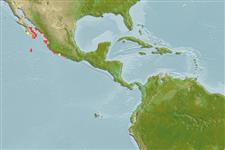>
Blenniiformes (Blennies) >
Chaenopsidae (Pike-, tube- and flagblennies)
Etymology: Acanthemblemaria: Greek, akantha = thorn + Greek, emblema, -atos, anything that is nailed, knocked in; also anything with bass or high relief (Ref. 45335).
Environment: milieu / Klimaatzone / Diepte / distribution range
Ecologie
marien rifbewoner; diepte 1 - 5 m (Ref. 11482). Tropical; 26°N - 16°N, 112°W - 100°W (Ref. 56265)
Eastern Central Pacific: Gulf of California.
Grootte / Gewicht / Leeftijd
Maturiteit: Lm ? range ? - ? cm
Max length : 5.2 cm TL mannelijk / geslacht onbekend; (Ref. 59088)
Korte beschrijving
Determinatiesleutels | Morfologie | Morfometrie
Found exclusively in empty barnacle shells on rocky reefs. Feeds on zooplankton. Oviparous (Ref. 56066). Eggs are attached to the walls of the parent's shelter and are brooded by the male parent (Ref. 56066).
Levenscyclus en paargedrag
Maturiteit | Voortplanting | Paaien | Eieren | Fecunditeit | Larven
Oviparous (Ref. 56066). Males guard the eggs until they hatch (Ref. 56066).
Allen, G.R. and D.R. Robertson, 1994. Fishes of the tropical eastern Pacific. University of Hawaii Press, Honolulu. 332 p. (Ref. 11482)
Status op de Rode Lijst van het IUCN (Ref. 130435: Version 2025-1)
Gevaar voor de mens
Harmless
Gebruik door de mens
Tools
Speciale rapporten
Download XML
Internetbronnen
Estimates based on models
Preferred temperature (Ref.
123201): 23.4 - 28.5, mean 26.2 °C (based on 64 cells).
Fylogenetische diversiteitsindex (Ref.
82804): PD
50 = 0.5000 [Uniqueness, from 0.5 = low to 2.0 = high].
Bayesian length-weight: a=0.00646 (0.00319 - 0.01305), b=3.10 (2.91 - 3.29), in cm total length, based on LWR estimates for this species & (Sub)family-body (Ref.
93245).
Trofisch niveau (Ref.
69278): 3.4 ±0.45 se; based on food items.
Fishing Vulnerability (Ref.
59153): Low vulnerability (10 of 100).
🛈
